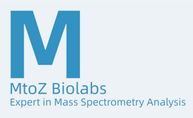
- Home
- Companies
- MtoZ Biolabs
- Services
- MtoZ Biolabs - Biopharmaceutical ...

MtoZ Biolabs - Model product-related-impurity-analysis - Biopharmaceutical Product-Related Impurities Analysis Service
During the production of bioproducts, it's common to find impurities not only produced in the manufacturing process but also related to the desired products. These product-related impurities typically consist of product variants that do not align functionally with the target product. The most common variants arise from chemical modifications, as well as from the degradation and aggregation of the target product. Protein heterogeneity are often caused by various unexpected post-translational modifications (PTMs), such as deamidation, acetylation, and improper disulfide bond formation. Techniques such as peptide mass fingerprinting, chromatography, and electrophoresis can be employed to detect these variants. Additionally, size-exclusion chromatography (SEC) is used to identify variants from the degradation and aggregation of the target product.
1. Degradation Products
Antibodies or proteins may degrade during production and storage, resulting in fragments or modifications such as oxidation and deamidation. These require detection using techniques such as mass spectrometry (MS), high-performance liquid chromatography (HPLC), and capillary electrophoresis (CE).
2. Polymers and Aggregates
Dimers, trimers, and other polymer forms need to be analyzed using SEC, HPLC, and MS.
3. Variants
Including isoforms and glycosylation variants, which are analyzed using techniques like MS, isoelectric focusing (IEF), and CE.
MtoZ Biolabs employs an array of sophisticated analytical techniques, such as high-resolution MS, MALDI TOF, high-performance chromatography, and capillary electrophoresis (CE), to analyze product-related impurities in bioproducts efficiently and accurately. Additionally, MtoZ Biolabs offers further characterization services for bioproducts.

1. Experimental Procedures
2. Instrument Parameters
3. Raw Data
4. Analysis Results of Product-related Impurities in Bioproducts
MtoZ Biolabs is an integrate contract research organization (CRO) providing advanced proteomics, metabolomics, bioinformatics, and biopharmaceutical analysis services to researchers in biochemistry, biotechnology, and biopharmaceutical fields. The name of MtoZ represents “mass to charge ratio” in mass spectrometry analysis, as most of our services are provided based on our well-established mass spectrometry platforms. Our services allow for the rapid and efficient development of research projects, including protein analysis, proteomics, and metabolomics programs.
MtoZ Biolabs is specialized in quantitative multiplexed proteomics and metabolomics applications through the establishment of state-of-the-art mass spectrometry platforms, coupled with high-performance liquid chromatography technology. We are committed to developing efficient, and effective tools for addressing core bioinformatics problems. With a continuing focus on quality, MtoZ Biolabs is well equipped to help you with your needs in proteomics, metabolomics, bioinformatics, and biopharmaceutical research. Our ultimate aim is to provide more rapid, high-throughput, and cost-effective analysis, with exceptional data quality and minimal sample.
Email: marketing@mtoz-biolabs.com
